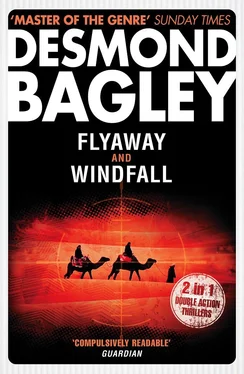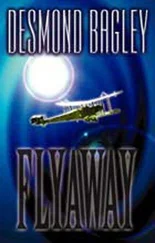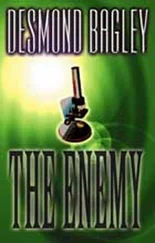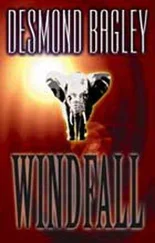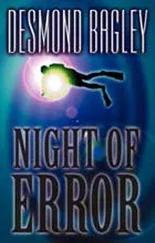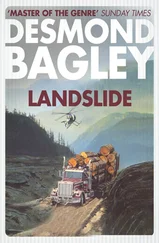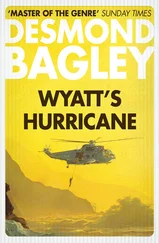I didn’t wait for an answer but got up and left him and, for once, I didn’t confide my findings to Byrne. This bit really had nothing to do with him; he knew nothing of England or of London and could contribute nothing.
I walked out of camp a couple of hundred yards and sat down to think about it. I believed Billson – that was the devil of it. I had told him that he was as transparent as glass, and it was true. Which brought me to McGovern.
I thought about that pillar of British industry for a long time and got precisely nowhere.
And so we travelled south.
At the Algerian border post Mokhtar guided Billson on foot around it while Byrne and I went through. There were more fiches to fill in – in triplicate, but we didn’t get the full treatment we had had at the police post outside Tammanrasset. We went on and waited for Billson in the no-man’s-land between the Algerian post and Fort Flatters in Niger, then it was my turn to walk, and Mokhtar took me on a long and circuitous route around the fort. If the two border posts compared notes, which Byrne doubted they would, then two men would have gone through both.
When Mokhtar and I rejoined the truck beyond Fort Flatters Byrne seemed considerably more cheerful. I was footsore and leg-stretched and was glad to ease myself down creakily into the seat next to him. As he let out the clutch he said gaily, ‘Nice to be home.’
We were eighty miles into Niger when we camped that night and the country hadn’t changed enough to justify Byrne’s cheeriness, but thereafter it became better. There was more vegetation – thorn trees, it’s true – but there was also more grass as we penetrated the mountains, and I saw my first running water, a brook about a foot across. According to Byrne, we had left the desert but, as I have said, these things are relative and this was still a wilderness to the untutored eye.
‘The Aïr is an intrusion of the Sahel into the desert,’ said Byrne.
‘You’ve lost me,’ I said. ‘What’s the Sahel?’
‘The savannah land between the desert and the forest in the south. It’s a geographer’s word. Once they called it the Sudan but when the British pulled out they left a state called the Sudan so the geographers had to find another word because they didn’t want to mix geography and politics. They came up with Sahel.’
‘Doesn’t look much different from desert.’
‘It’s different,’ said Byrne positively. ‘These uplands get as much as six inches of rain a year.’
‘That’s a lot?’
‘A hell of a lot more than Tam,’ he said. ‘There’ve been periods of up to ten years when it hasn’t rained there at all.’
We stopped at a small village called Iferouane which must have been important in the Aïr because it had an airstrip. Although the people here were Tuareg there was a more settled look about them. ‘Still nomadic,’ said Byrne. ‘But there’s more feed around here, so they don’t have to move as far or as often.’
There were more animals to be seen, herds of camels, sheep and goats, with a few hump-backed cattle. The Tuareg seemed to be less formal here than in the north and some of the faces I saw were decidedly Negroid. I mentioned that to Byrne, and he shook his head. ‘Those people are either Haratin or slaves.’
‘Slaves!’
‘Sure. The Tuareg used to go raiding across the Niger Bend to bring back slaves.’
‘Is there still slavery?’
‘Theoretically – no. But I wouldn’t bet on it. A few years ago a British novelist bought a slave in Timbouctou just to prove that it could be done. Then he set the man free which was a damnfool thing to do.’ He saw my frown. ‘He had no land, so he couldn’t grow anything; he had no money so he couldn’t buy anything – so what was the poor bastard to do? He went back to his old master.’
‘But slavery!’
‘Don’t get the wrong idea,’ said Byrne. ‘It’s not what you think and they don’t do too badly.’ He smiled. ‘No whips, or anything like that. Here, in the Aïr, they grow millet and cultivate the date palms on a share-cropping basis. Theoretically they get a fifth of the crop but a smart guy can get as much as half.’
Byrne seemed well-known and popular in Iferouane. He talked gravely with the village elders, chaffed the young women, and distributed sweets and other largesse among the children. We stayed there a day, then pushed on south over rougher country until we arrived at Timia and Byrne’s home.
Ever since we had left Fort Flatters, Billson had avoided me. He couldn’t help being close in the truck but he didn’t talk and, out of the truck, he kept away from me. I suppose I had not hidden my contempt of him and, naturally enough, he didn’t like it. I had penetrated his thick skin and wounded whatever amour propre he had, so he resented me. I noticed that he talked a lot with Byrne during this time and that Byrne appeared to show interest in what he was saying. But Byrne said nothing to me at the time.
Byrne was un Tuareg enough to have built himself a small house on the slopes of what passed for a pleasantly-wooded valley in the Aïr. The Tuareg in the area lived, not in leather tents as they did in the desert to the north, but in reed huts, cleverly made with dismountable panels so that they could be collapsed for loading on the back of a pack camel. But Byrne had built a house – a minimal house, it is true, with not much in the way of walls – but a house with rooms. A permanent dwelling and, as such, foreign to the Tuareg.
We arrived there late and in darkness and I didn’t see much that night because we ate and slept almost immediately. But next morning, Byrne showed me around his kingdom. Close by there was something which, had it been permanent, would have been called a village and Byrne talked to a man whom he told me was Hamiada, Mokhtar’s brother. Hamiada was tall, even for a Targui, and his skin, what little I could see of it above his veil, was almost as white as my own.
Byrne said to me, ‘Most of the herd’s grazing out towards Telouess – about twenty kilometres away. I’m going out there tomorrow. Like to come?’
‘I’d like that,’ I said. ‘But what about Billson?’ Billson was not with us; when we had left that morning he was still asleep.
Byrne looked troubled. ‘I want to talk to you about him – but later. Now I want to show you something.’
Hamiada had gone away but he returned a few minutes later leading a camel. It was one of the biggest beasts I had seen and looked to be about ten feet high at the hump, although it could hardly have been that. It was of a colour I had never seen before, a peculiar smokey-grey. Byrne said, ‘This is my beauty – the cream of my herd. Her name is Yendjelan.’
He spoke with such obvious pride that I felt I had to echo it even though I was no expert on the finer points of camel-breeding. ‘She’s a very fine animal,’ I said. ‘A racing camel?’
He chuckled. ‘There’s no such thing. She’s a Mehari – a riding camel.’
‘I thought they raced.’
‘Camels don’t run – not unless they’re urged. And if they run too far they drop dead. Fragile animals. When you come with me tomorrow you’ll be riding one. Not Yendjelan, though; she’s mine.’
Yendjelan looked at me in the supercilious way of a camel, and her lip curled. She thought as much of the idea of me riding a camel as I did.
We looked at some more of Byrne’s herd, the few that were browsing close by. As I watched them chewing up branches of acacia, three-inch thorns included, I wondered how in hell you controlled a camel. Their mouths would be as hard as iron.
We accepted Hamiada’s hospitality – cold roast kid, bread and camel milk. Byrne said abruptly, ‘About Billson.’
Читать дальше
